|
|
|
Sort Order |
|
|
|
Items / Page
|
|
|
|
|
|
|
| Srl | Item |
| 1 |
ID:
186665


|
|
|
|
|
| Summary/Abstract |
Knowledge creation is a social enterprise, especially in political science. Sharing new findings widely and quickly is essential for progress. Scholars can now use Twitter to rapidly disseminate ideas, and many do. What are the implications of this new tool? Who uses it, how do they use it, and what are the implications for exacerbating or ameliorating existing inequalities in terms of research dissemination and attention? We construct a novel dataset of all 1,236 political science professors at PhD-granting institutions in the United States who have a Twitter account to answer these questions. We find that female scholars and those on the tenure track are more likely to use Twitter, especially for the dissemination of research. However, we consistently find that research by men shared on Twitter is more likely to be passed along further by men than research by women.
|
|
|
|
|
|
|
|
|
|
|
|
|
|
|
|
| 2 |
ID:
098222
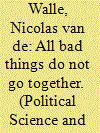

|
|
|
| 3 |
ID:
127117


|
|
|
|
|
| Publication |
2013.
|
| Summary/Abstract |
Since the end of the Cold War, political scientists have radically reexamined the role that elections play in authoritarian contexts. Some argue elections are congruent with authoritarianism and actually help to stabilize non-democratic forms of rule. Others challenge this claim by arguing that elections can function as a mechanism for democratization. We test whether elections have functioned as a mechanism of change or of neo-authoritarian stability in the postcommunist world. We generally find that elections neither promote democracy nor strengthen authoritarianism. However, we do find that in energy-rich states elections promote authoritarianism, though of a somewhat more benign sort. We also find that the mechanisms of electoral participation and competitiveness thought to promote democracy function differently in the postcommunist context and explore this in greater detail through a paired case study of electoral mobilization in Slovakia and Belarus.
|
|
|
|
|
|
|
|
|
|
|
|
|
|
|
|
| 4 |
ID:
138420


|
|
|
|
|
| Summary/Abstract |
Although there is now a wealth of scholarship concerning the onset, duration, and termination of civil wars, there is not nearly as much empirical research by political scientists on the potential for postconflict democratization in countries that have been the site of civil wars. This relative scholarly neglect of post–civil war democratization stands in contrast to the efforts and resources that other actors—foreign ministries, international and nongovernmental organizations, and members of civil society—have invested in attempting to help construct democracy in postconflict states such as Indonesia, Liberia, and Uganda.
|
|
|
|
|
|
|
|
|
|
|
|
|
|
|
|
| 5 |
ID:
116433
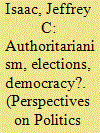

|
|
|
|
|
| Publication |
2012.
|
| Summary/Abstract |
The demand for democracy is a pervasive feature of contemporary political discourse. It is a compelling demand, for citizens and elites who rally beneath the banner of "democracy" and for political scientists who study the ways citizens and elites rally beneath banners in order to mobilize, seek, and contest political power. The force of this demand was captured by the cover of our June 2011 issue, which featured a wall in Egypt's Tahrir Square covered with graffiti stating that "Mubarak must go" and calling for "freedom" and "democracy."
|
|
|
|
|
|
|
|
|
|
|
|
|
|
|
|
| 6 |
ID:
113540
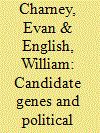

|
|
|
|
|
| Publication |
2012.
|
| Summary/Abstract |
Political scientists are making increasing use of the methodologies of behavior genetics in an attempt to uncover whether or not political behavior is heritable, as well as the specific genotypes that might act as predisposing factors for-or predictors of-political "phenotypes." Noteworthy among the latter are a series of candidate gene association studies in which researchers claim to have discovered one or two common genetic variants that predict such behaviors as voting and political orientation. We critically examine the candidate gene association study methodology by considering, as a representative example, the recent study by Fowler and Dawes according to which "two genes predict voter turnout." In addition to demonstrating, on the basis of the data set employed by Fowler and Dawes, that two genes do not predict voter turnout, we consider a number of difficulties, both methodological and genetic, that beset the use of gene association studies, both candidate and genome-wide, in the social and behavioral sciences.
|
|
|
|
|
|
|
|
|
|
|
|
|
|
|
|
| 7 |
ID:
118758
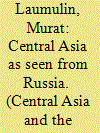

|
|
|
|
|
| Publication |
2012.
|
| Summary/Abstract |
This is a survey of what has been written in Russia about Central Asia, of the subject range and scope of problems that our Russian colleagues have discussed in their works, and of what they think about the region's future. For obvious reasons, the Russian public as a whole and political scientists and politicians as its part cannot remain indifferent to what is going in Central Asia. Until quite recently, Russia and Central Asia were parts of a single state; today they remain tied together by geographic and geopolitical proximity. For these reasons, the region is still part of Russia's information expanse.
The Russian Federation, which has scored quite a few foreign policy successes, is still facing old and persisting problems and is coping with the new challenges that crop up in the contemporary world. The integration initiatives formulated by Russia are hailed by some of its post-Soviet partners and rejected (or even undermined) by others.
|
|
|
|
|
|
|
|
|
|
|
|
|
|
|
|
| 8 |
ID:
124084
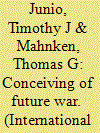

|
|
|
|
|
| Publication |
2013.
|
| Summary/Abstract |
This article introduces political scientists to scenarios-future counterfactuals-and demonstrates their value in tandem with other methodologies and across a wide range of research questions. The authors describe best practices regarding the scenario method and argue that scenarios contribute to theory building and development, identifying new hypotheses, analyzing data-poor research topics, articulating "world views," setting new research agendas, avoiding cognitive biases, and teaching. The article also establishes the low rate at which scenarios are used in the international relations subfield and situates scenarios in the broader context of political science methods. The conclusion offers two detailed examples of the effective use of scenarios.
|
|
|
|
|
|
|
|
|
|
|
|
|
|
|
|
| 9 |
ID:
098224
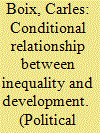

|
|
|
| 10 |
ID:
100931
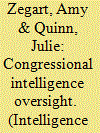

|
|
|
|
|
| Publication |
2010.
|
| Summary/Abstract |
This article seeks to reconcile congressional oversight models in theory with oversight realities in intelligence. For nearly three decades, political scientists have argued that Congress controls the bureaucracy - and in surprisingly efficient ways. Yet the history of intelligence oversight suggests the opposite. We take a fresh look at the logic and empirics of police patrol and fire alarm models and find that neither explains intelligence oversight well. Both rely on assumptions, such as the presence of strong and plentiful interest groups, which characterize domestic policy but not US intelligence policy. Our data - comparing committee hearing activities, legislative productivity, and interest groups across different policy domains between 1985 and 2005 - reveal that oversight varies dramatically by policy issue, and that intelligence almost always ranks at the bottom. Ironically, the same electoral incentives that generate robust oversight in some policy areas turn out to be far weaker in intelligence.
|
|
|
|
|
|
|
|
|
|
|
|
|
|
|
|
| 11 |
ID:
096654
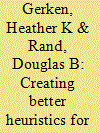

|
|
|
|
|
| Publication |
2010.
|
| Summary/Abstract |
Heather K. Gerken and Douglas B. Rand propose creating citizen assemblies to vet presidential hopefuls in order to give low-information voters a useful heuristic for casting their votes. Their conceptual claim is that citizen assemblies should be of interest to the vast swaths of political science preoccupied with making representative democracy work. By shearing away the deliberative baggage that has long accompanied proposals like this one, the authors highlight the role that citizen assemblies can play in helping low-information voters make sensible choices.
|
|
|
|
|
|
|
|
|
|
|
|
|
|
|
|
| 12 |
ID:
025589
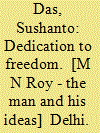

|
|
|
|
|
| Publication |
DelhI, Ajanta Publications, 19??.
|
| Description |
122p.Hbk
|
| Standard Number |
8120201698
|
|
|
|
|
|
|
|
|
|
|
|
Copies: C:1/I:0,R:0,Q:0
Circulation
| Accession# | Call# | Current Location | Status | Policy | Location |
| 027293 | 923.254/DAS 027293 | Main | On Shelf | General | |
|
|
|
|
| 13 |
ID:
126344
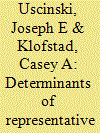

|
|
|
|
|
| Publication |
2013.
|
| Summary/Abstract |
In May 2012, political scientists learned of efforts by representative Jeff Flake (R-AZ) to eliminate political science funding from the National Science Foundation (NSF) budget. The American Political Science Association (APSA) was caught off-guard, and concerned political scientists scrambled to contact their representatives and urge the amendment's defeat. Flake's initial effort to cut funds overall from the NSF was defeated, but a second measure, specifically to keep the NSF from funding political science, passed only hours later. This was the second time in three years that legislators targeted the NSF Political Science Program. Although these measures have been sponsored and widely supported by Republicans, some Democrats have supported these measures as well. This article examines the vote on the Flake Amendment to understand why individual representatives voted for or against cutting NSF funding for political science research.
|
|
|
|
|
|
|
|
|
|
|
|
|
|
|
|
| 14 |
ID:
187721
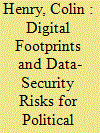

|
|
|
|
|
| Summary/Abstract |
As greater shares of research and data are digitized, political scientists are increasingly confronted with questions pertaining to data security. Yet, data-management plans rarely evaluate the risks pertaining to a researcher’s data across all project phases. This article highlights distinct risks related to key phases of the research process that deserve more attention by scholars. We emphasize risks during a project’s inception and pre-data-collection phases, as well as risks associated with data publication and its afterlife. We discuss how shifts in political context and (re)newed politicization of topics can present new security risks for both the researcher and the researched communities long after a project has been completed. We provide a framework for recognizing and mitigating data risks, thereby contributing to the growing interest in data-security best practices.
|
|
|
|
|
|
|
|
|
|
|
|
|
|
|
|
| 15 |
ID:
116461
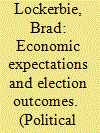

|
|
|
|
|
| Publication |
2012.
|
| Summary/Abstract |
Do our models of political behavior bear any resemblance to reality? Forecasting elections is one opportunity to assess whether our models of voting behavior are accurate. Over the past few decades, political scientists have been willing to put themselves out there to forecast elections. Explaining a past event allows us the ability to retrofit our models before we make them available to the broader community. In short, forecasting elections provides us the opportunity to develop humility. The forecasting community has done a reasonable job over the past few elections. Aside from 2000, forecasters have been largely accurate. Even in 2000, the forecasting community can claim a modest victory. The community was right about the popular vote winner; it just happened that the popular vote winner lost the election that counts-the Electoral College.
|
|
|
|
|
|
|
|
|
|
|
|
|
|
|
|
| 16 |
ID:
100826
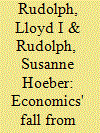

|
|
|
|
|
| Publication |
2010.
|
| Summary/Abstract |
Not long ago, many political scientists suffered from economics envy. Some still do. They view economics as the queen of the social sciences, claiming that it is "scientific," like physics. Physicists and other natural scientists spend most of their time trying to explain phenomena, but non-behavioral micro-economists spend most of their time on mathematical proofs and econometric tests of a priori theories based on intuitive plausibility or principles of "rational action." Being "scientific" it was alleged, meant that economics could access objective knowledge, knowledge that was said to be true independent of time, place, and circumstance. Robert Bates called on political scientists to do the same by arguing that they should be in search of "lawful regularities which … must not be context bound" (Bates 1997b).
|
|
|
|
|
|
|
|
|
|
|
|
|
|
|
|
| 17 |
ID:
121619
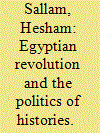

|
|
|
|
|
| Publication |
2013.
|
| Summary/Abstract |
The Arab "revolutions" and the events surrounding them have posed a variety of theoretical challenges to political scientists. Popular uprisings have resulted in the ouster of long-standing autocrats in Tunisia, Egypt, Libya, and Yemen, and are seriously threatening the survival of incumbent authoritarian rulers in a region that once seemed immune to democratic change (Brumberg 2002; Fish 2002; Heydemann 2007; Posusney and Angrist 2005; Salamé 1994; Schlumberger 2007). These unforeseen developments pushed scholars of politics back to the drawing board to revisit dominant theoretical understandings of the drivers of regime change and stability (Albrecht and Bishara 2011; Bellin 2012; Blaydes and Lo 2012; Brownlee and Stacher 2011; Droz-Vincent 2011; Gause 2011; Goldstone 2011; Hoffman and Jamal 2012, Lynch 2011; Masoud 2011; Stacher 2012).
|
|
|
|
|
|
|
|
|
|
|
|
|
|
|
|
| 18 |
ID:
105371
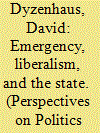

|
|
|
|
|
| Publication |
2011.
|
| Summary/Abstract |
In the wake of 9/11, many political scientists and theorists in the United States of America turned their attention to the topic of emergencies. That required them to confront a fundamental question: Are emergencies to be studied as important in their own right, as altogether exceptional events that threaten the very existence of a society in unforeseeable ways? Or are they important, not because they are radically distinct from the normal situation of politics, but because they bring to the surface otherwise implicit aspects of normal politics?
|
|
|
|
|
|
|
|
|
|
|
|
|
|
|
|
| 19 |
ID:
096201
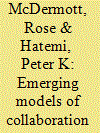

|
|
|
|
|
| Publication |
2010.
|
| Summary/Abstract |
In increasing numbers, political scientists are engaging in collaborative research. It is useful to consider the advantages of such efforts and to suggest strategies for finding optimal collaborators. In addition, there are issues and challenges that arise in the face of increased collaboration, particularly interdisciplinary collaboration across the life and social sciences. Inevitably, as the discipline has moved from a dominant solo-author model to a wider array of authorship possibilities, whether those teams encompass two-person partnerships, large research teams, or something in between, new administrative and cultural questions have already begun to surface as the discipline works to assimilate these changes. Consonant with previous efforts by the American Political Science Association (Biggs 2008; Chandra et al. 2006), we seek here to continue a broader disciplinary conversation surrounding the opportunities and challenges posed by more diverse patterns of teamwork. In so doing, we hope to help continue to encourage transparent, predictable, and openly collaborative intellectual partnerships wherein individuals receive the institutional credit and merit they deserve.
|
|
|
|
|
|
|
|
|
|
|
|
|
|
|
|
| 20 |
ID:
146824
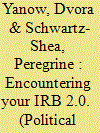

|
|
|
|
|
| Summary/Abstract |
This essay corrects and updates one that was originally published in Qualitative & Multi-Method Research and, in a condensed version, in three other APSA Organized Section newsletters. Our research into IRB policy has shown that many political scientists are not familiar with some of its key provisions. The intent of the essay is to increase awareness of the existing policy’s impact on political scientific research and, in particular, on graduate students and junior faculty. We remain concerned that at present, faculty are leaving discussions of research ethics to IRBs (and their counterparts worldwide), whereas these Boards largely focus on complying with the regulatory details of governmental policy. Even though this essay seeks to clarify the latter, we remain convinced that research ethics ought to be vigorously taken up within disciplinary and departmental conversations.
|
|
|
|
|
|
|
|
|
|
|
|
|
|
|
|
|
|
|
|
|